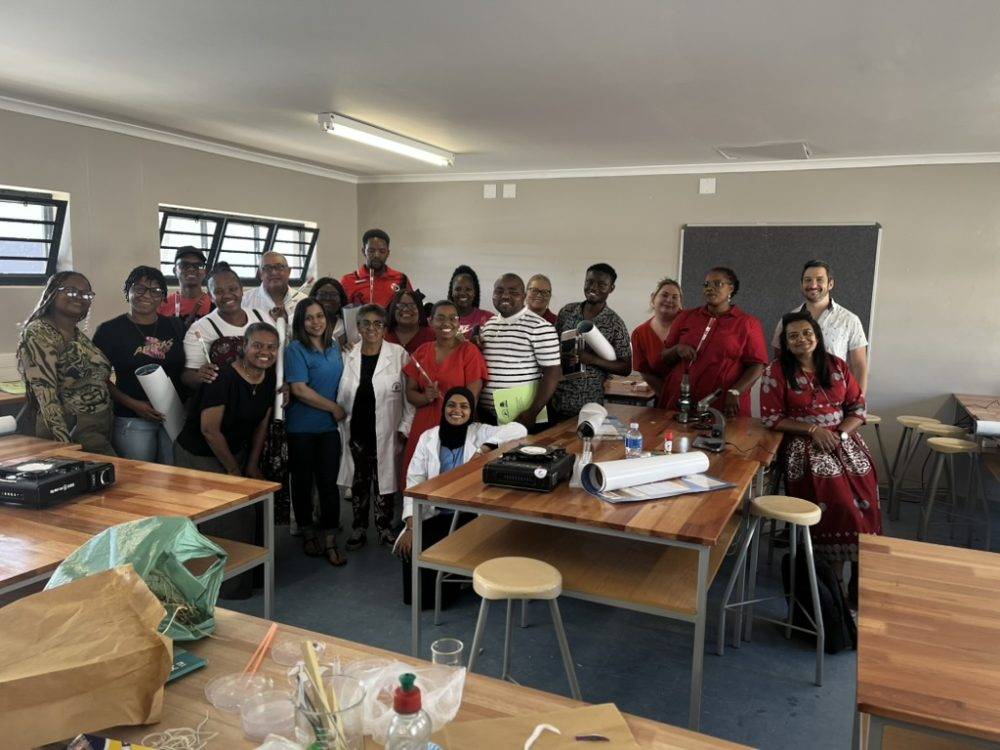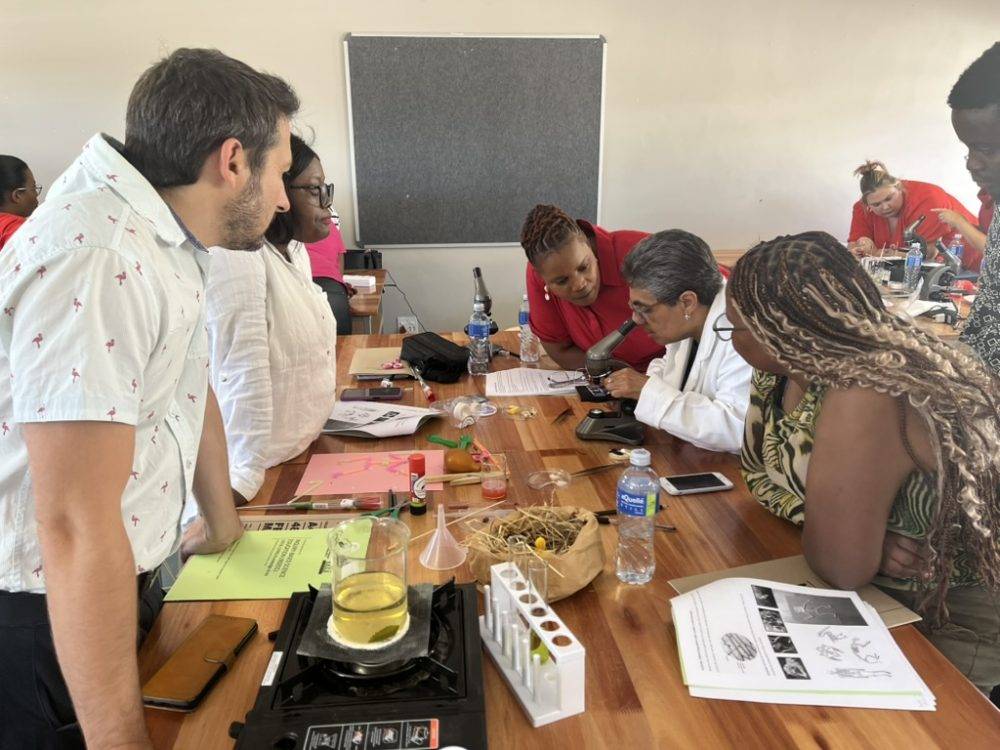
Advancing Knowledge Non-Profit Company (AK NPC) expanded its training of natural sciences teachers to the Overberg Education District. On Friday 14 February 2025 (valentine’s day no less) 18 intersen phase (grades 4-7) natural sciences teachers attended the training session at Fisherhaven Academy Secondary School in Fisherhaven , Hermanus. This session was followed by training of a cohort of senior phase (grades 8 and 9) natural sciences teachers on Saturday 15 February 2025 at the same venue. Prof Shaheed Hartley, Director of AK NPC welcomed teachers and provided some insight into the SACE-endorsed Inquiry-Based Science Education programme. The sessions were arranged with the assistance of Overberg science subject advisors, Mr Jandre Gerber and Ms Clothilda van Aarde – the former attending and participating on both days. The sessions formed the first part of training planned for 2025 and dealt in detail with the inquiry-based (practical) approach to teaching the curriculum content of the first term namely the Life and Living knowledge area also called life sciences. The training programme forms part of Advancing Knowledge NPC’s partnership with Garden Cities Archway Foundation and Western Cape Education Department.
INQUIRY-BASED LIFE SCIENCES FOR INTERSEN NATURAL SCIENCES TEACHERS
The session was facilitated by Ms Dawn Faroe supported by Mr Fadli Wagiet and the AK NPC staff Saadiqah Fraden (science intern) and Melissa Petersen (projects coordinator). Teachers were introduced to the inquiry-based approach to teaching natural sciences while being engaged in a discussion about the inclusion of this teaching strategy in their natural sciences classes and the challenges that they faced in their everyday lessons. Teachers enjoyed the hands-on approach to life sciences with the practical and creative examples that were used to illustrate the curriculum content. The intent of the course was to provide teachers with practical examples that can be easily replicated in their life sciences lessons so that learners can participate in a hands-on practical manner. Teachers had to apply their knowledge in a practical sense by handling different animal and plant species within various food chains, constructing habitats of various animals with available resources, extracting chlorophyl from leaves and testing for the end-products of photosynthesis, extracting DNA from strawberries and other products, putting together models of skeletons as well as learning how to use a microscope and the functioning of its various components, making slides samples of different products and identifying plant cell organelles under the microscope.
Both subject advisor and teachers were very appreciative of the session. In their reflection of the InterSen (grades 4-7) session, the following were captured:
- I did not think that I would enjoy the session as I did not think I could make the life sciences content so exciting. I was pleasantly surprised. [Teacher].
- Two of us asked to leave an hour early, but found ourselves so engrossed in the practical element of the session we stayed beyond the end of the session [Teacher].
- The inquiry-based approach is really making the content come alive. We could work with the specimens ourselves and our learners would be able to as well. I cannot wait for the next session on chemistry. [Teacher]
- Thank you for adding so much value to our teachers’ natural sciences lessons. The inquiry-based approach demonstrated how interesting life science teaching can be and I saw the passion for science reignited in some of our teachers’ eyes. [Science Subject Advisor].

HANDS-ON INQUIRY APPROACH FOR SENIOR PHASE LIFE SCIENCES TEACHERS
This session for grades 8 and 9 teachers of natural sciences was facilitated by Mr Fadli Wagiet supported by Ms Dawn Faroe and AK NPC staff. The session with this group of teachers started as an interaction between the facilitator and teachers on how they use practical work in their everyday classes. Some teachers indicated that practical work was an add-on and done only at the end of the term, a number of teachers pointed out that they would only demonstrate some content practically while others said they hardly get time to do practical science. A discussion ensued of the inquiry-based approach as a hands-on teaching strategy to introduce the curriculum content to learners and the viability of this approach in their life sciences lessons. The facilitator highlighted some of the life sciences content and engaged teachers throughout the session in setting up inquiry-based methodology for teaching including (i) testing for starch in various food products and analysing the results in popcorn, apples, oranges, milk, potatoes, cheese and bread; (ii) a discussion about microorganisms leading to viewing the content of yoghurt under the microscope and making a short video of the microorganisms viewed through the microscope; (iii) conducting experiments on photosynthesis and demonstrating respiration; (iv) considering the physiological process of the major organs of the human body including the heart, lungs, liver and kidney, conducting simulations of the operation of these organs using everyday products and conducting a dissection of sheep trachea, heart, lungs, liver and kidneys; (v) microscopy of plant cells to view the functioning organelles of onion cells; and (vi) a discussion of DNA leading into the extraction of DNA from strawberries and bananas.
Teachers highlighted the following about the session:
- The sessions allowed me a different perspective of how to approach the life sciences content. I will definitely be implementing this approach and the activities that we did here. [Teacher]
- I was reminded of how important the practical element of our teaching is and the importance of engaging the learners in the work. [Teacher]
- I do most of the practical work but this session has highlighted some more and different aspects of practically engaging learners. [Teacher]
- Many of the teachers here have thanked me for bringing the session to them. I must also express my appreciation of how accessible you make the content for our teachers. Thank you. Looking forward to the next session on chemistry. [Science Subject Advisor].